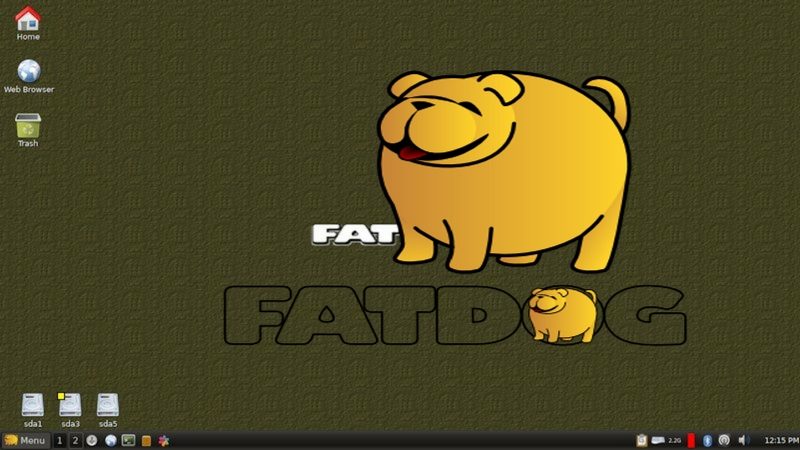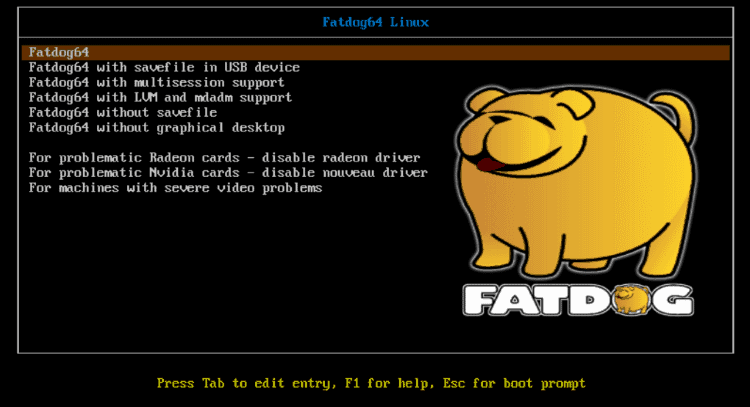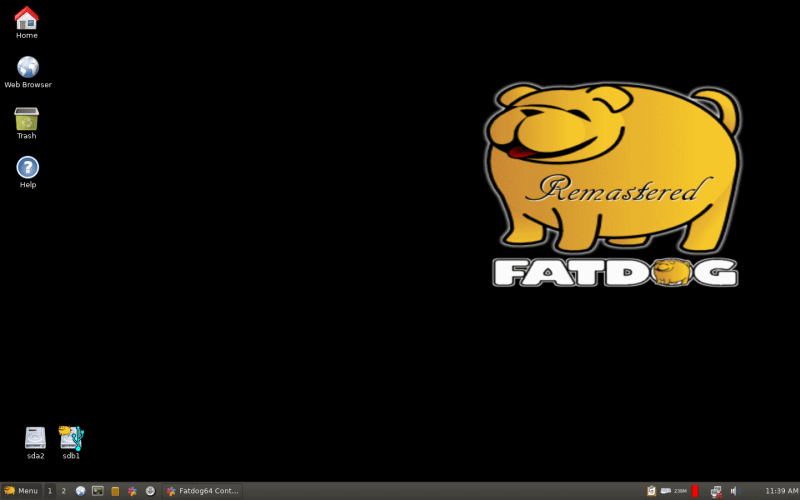Brief: We review FatDog64 Linux. This lightweight Linux distribution might not be modern but it is very well suited for an aging computer.
There is a Linux distro for pretty much every need. There are Linux distributions for hackings, astronomy, education, forensics, and even robotics. FatDog64 will change how you compute on the go.
In the Beginning, was the Puppy…

FatDog64 was originally based on Puppy Linux. Puppy Linux was first released in 2003 with the goal of creating a Linux distro that was fast and easy to use right out of the box, while also being able to run in RAM.
Puppy is not just one distro. Instead, it is a family of distros that share the same principles and are built using the same tools but supporting different distros and different needs. For example, the official Puppies are based on Ubuntu and Slackware. Puppy also supports Arch, Mageia, and Trisquel through its Woof-CE build system.
…and There was FatDog64
Originally created as a custom version of Puppy in 2008 with more applications available out of the gate, FatDog64 become its own project. Even though it is an independent project, it still follows Puppy’s goals of being small, fast, and efficient.
OS on the Go
Like all other Linux distros, you have the option of installing FatDog64 and running it from your hard drive, but you can also run it from a thumb drive. So this is the method I opted for. I downloaded the ISO file (369 MB) and loaded it on a spare thumb drive using Rufus.

When you boot into FatDog64, you are greeted by a menu where you can select how to proceed. From here you can boot normally, with a savefile on USB, with multisession support, with LWM and mdadm support, without a savefile, and without a graphical desktop. There are also a couple of options to help you deal with graphics problems.
Since I wanted to play around with the savefile feature, I selected it. Less than a minute later, I was greeted with an Openbox-powered desktop. (Note: FatDog64 has a neat option that allows you to switch between Openbox and JWM.)
FatDog64 offers quite a few applications out of the box. There’s pretty much something in every category. The majority of the applications were lightweight versions that I hadn’t seen before, such as mtPaint, PeasyGlue, and Pwget. However, several larger applications were also included, such as LibreOffice, VLC media player, GIMP, and SeaMonkey. (SeaMonkey is an internet suite from Mozilla which consists of a web browser, an email client, HTML editor, and an IRC client.) You also have the option to install Firefox and Chrome from the menu. Flash work from the word go.
The fact that LibreOffice, VLC media player, and SeaMonkey are included in this distro amazes me. The installer for LibreOffice is over 200MB alone. Yet, the FatDog64 ISO is just a little over 300 MB. They must have come up with some very impressive compressions.

Now to look at the setting. FatDog64 keeps all system settings in one easy-to-find place: the FatDog64 Control Panel. The Control Panel has settings grouped by the following topics: Localisation, Desktop, Sound, Network, System, Utilities, and Updates.
The easiest way to get on the internet is to use the Network Wizard in the Network section of the Control Panel. Double-clicking on the icon will launch an easy-to-use shell script that will walk you through selecting your wifi and setting it up. I also found that using the Network Wizard was the fastest way to get the wifi going again when you restart.
FatDog64 makes use of the Gslapt package manager from Slackware, but uses the XZ-compressed tarball (TXZ) as its package format. Since FatDog64 is not based on Slackware it is possible to install packages from Slackware, but they may not work. FatDog64 also supports SFS packages, but there are only a handful of such packages.
Finally, when you tell FatDog64 to shut down after selecting the savefile on USB option at boot, it walks you through the creation of the savefile so that when you restart you can pick up from where you left off last time.
Overall Thoughts
Overall, I think FatDog64 is a great little distro. It would be perfect for traveling without a computer. All you would have to do is find a spare computer and plug in your USB drive. It has all the requirements of an operating system: a browser, an office suite, a media player, and enough extra apps to solve most problems.
I did find a couple of things lacking. I like using Qupzilla as a lightweight browser, but it was not available in the package manager. There were a couple of other mainstays from my workflow missing. It’s not surprising that a small distro like this doesn’t have a huge amount of apps like Ubuntu.
Also, I did have some trouble with the system freezing up once in a while when I tried to resize a window and racing to 100% CPU usage. I tried to upgrade to the newest kernel but had trouble figuring out to proceed after it was downloaded. It would be helpful if that was a little easier to figure out.
Still, I would recommend giving this distro a try. It’s amazing how much can be packed in such a small package.
Interestingly, FatDog64 also has an ARM version. It currently has support for a bunch of ARM boards.
Have you used FatDog64 Linux in the past? If so, how was your experience? Can we count it among the best Linux distributions for older computers?
If you found this article interesting, please share it with your friends and family on your favorite social media sites.

